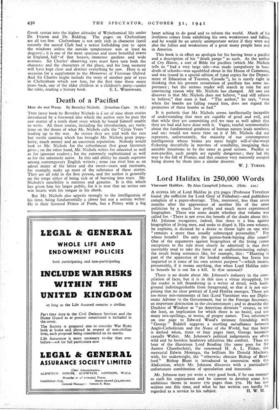Lord Halifax in 250,000 Words
Viscount Halifax. By Alan Campbell Johnson. (Hale. 2ts.)
A GUINEA life of Lord Halifax in 570 pages (Professor Trevelyan found 38o sufficient for Lord Grey of Fallodon)—and publishers complain of a paper-shortage. This, moreover, less than seven months after the appearance of another life of the same politician by a much less prolix and much more experienced biographer. There was some doubt whether that volume was called for. .‘ There is not even the benefit of the doubt about this. Mr. Johnson recognises, indeed, that there is a bias against biographies of living men, and seeks to dispel it. His own volume, he explains, is dictated by a desire to throw light on one who " remains a more than usually submerged personality." For whose benefit? Do only the guinea-book-buying elite count? One of the arguments against biographies of the living (some exceptions to the rule must clearly be admitted) is that they inevitably tend to take the form of an undiscriminating eulogy, the result being sentences like, for example, this : " Hunting is part of the apparatus of the landed nobleman, but Irwin has imparted to it some of his own earnest purpose "—which means, presumably, if it means anything, that when Lord Halifax rides to hounds he is out for a kill. Is that unusual?
There is no doubt about Mr. Johnson's industry in the com- pilation of facts, but it is in this case a virtue misapplied, for the reader is left floundering in a welter of detail, with back- ground indistinguishable from foreground, so that it is not sur- prising that no clear portrait of Lord Halifax emerges. There are too many mis-statements of fact (Lord Vansittart was not Diplo- matic Adviser to the Government, but to the Foreign Secretary, an important distinction in the circumstances ; and to describe the Duchess of Windsor as " an American divorcée " creates, to say the least, an implication for which there is no basis), and too many mis-spellings, or worse, of proper names. Two references on one page to Edward Wood's intimate friendship with " George " Riddell suggests a startling misalliance between Anglo-Catholicism and the News of the World, but that hope is dashed when, three or four pages later, George becomes casually Walter. Mr. Johnson's political judgements are often wild and he lavishes laudatory adjectives like confetti. Thus we hear of the illustrious Lord Reading (the same goes for Sir Austen Chamberlain), the renowned H. A. L. Fisher, the mercurial Edwin Montagu, the brilliant Sir Donald Maclean, with, for makeweight, the " otherwise obscure Bishop of Brad- ford." Bishop Blunt is introduced in. connexion with the Abdication, which Mr. Johnson discusses with a particularly unfortunate combination of speculation and innuendo. - Mr. Johnson may yet write a very good book, if he can manage to curb his copiousness and -be content to develop some less ambitious theme in nearer 170 pages than 570. He has not written one this time, and what he has written can hardly be regarded as a service to his subject. H. W. H.






















 Previous page
Previous page